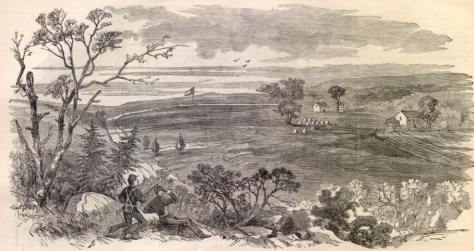This letter was written by Franklin (“Frank”) Browning Lukens (1843-1863), the son of cabinetmaker Chileon Lukens (1800-1872) and his wife, Sarah Johnson (1801-1882) of Philadelphia, Pennsylvania. In late May 1861, Frank enlisted in Co. E, 3rd New Jersey Infantry. This regiment was brigaded with the 1st, 2nd, and 4th New Jersey to form the famous First New Jersey Brigade.
Frank did not complete his three years, however. He was discharged out of the service on 10 November 1862 at Fairfax Seminary, his health broken from exposure in the Chickahominy swamps of the Peninsular Campaign. He died a year later on 17 November 1863.
In January 1862, Frank was married to Mary Somers Burkett (1842-1901) at the Summerfield United Methodist Church in Philadelphia.

Transcription
[Northern] Virginia
September 6, 1861
Dear Father and Mother,
I write this letter as the things happened. I am right well and I hope this letter will find you the same. It is pretty hot down here yet. On Thursday things got a little quieter. On Friday morning there was two of Company D pickets shot. One of them was shot through the shoulder and the other in the side. It is very dangerous to be on picket now. ¹

On Saturday morning [31 August] the Colonel [George W. Taylor] started out with about 50 men on a scout and he had not gone over half a mile from the outer picket and they were a coming out of a cornfield and came upon two companies of the rebels drilling. Our party had the first crack at them and they did not know how many men they killed of the rebels but they killed two of our men and wounded three. There was one of the wounded died on Tuesday. But our men had to fall back to the blacksmith shop. ²
I had a job for two days helping to build a slaughter house. They are a building a fort on our campground. It is to be called Fort Taylor. There is three companies works on it three hours each day out of the four regiments. There is 4 cannons mounted on it already—two 20-lb cannons and two 10-lb cannon rifles. They will soon have it finished. There is squads of men out of the four regiments cutting down trees about two miles around the fort.
Our company went on picket on Sunday. Our outer pickets is stationed out as far as Mister Demming’s house. We have got possession of the house. He moved into Washington and left all his furniture behind. The rebel pickets have got possession of the other end of his farm which is about 400 yards from the house. We keep firing at one another all the time. On Monday it was all quiet on the outpost and I received your letter about 9 o’clock in Monday night. On Tuesday afternoon there was three cavalry came up to the outpost and the first thing we knowed, there was 5 shots fired at us. They were in a cornfield and we could not see them. On Tuesday night everything was quiet. On Wednesday morning we was attacked. There is 6 men on a post. The was 6 up at Demming’s house and 6 on the pike. They were along side of three haystacks and the rest of the company was a laying at the blacksmith shop. It was about 5½ o’clock when we was attacked. It was a scouting party of the rebels. They drove our pickets away from the house and the haystacks but we burnt the haystacks down and a church also. They drove us to the blacksmith shop but they could get us no further. The stockade is across the road there and they kept themselves in the woods, There was a company of the 2 Regiment not far off on picket and they came over to see what was the matter and they soon seen what was up. We made a charge on them and got possession of the house again and we were a firing at one another all day. There was three of our men narrowly escaped being shot and we was relieved in the afternoon at 4 o’clock.
Each company has to go on picket 3 days. We could see their battery from where we was on picket. It was about a mile off. It is on Munson’s Farm. The people is all a moving into Washington out around Alexandria, We don’t do any drilling now.
Did you ever get that money from Bill Keeley? We got paid off on Thursday afternoon and I will send 20 dollars home. I send my best respect to all hands. We are under marching orders. That is all at present.— F. B. Lukens
The next letter I write will be for Charles.

¹ In August 1861, the Third New Jersey had frequent brushes with the Rebel pickets at their outposts on the Little River turnpike after Longstreet advanced his headquarters from Centreville to Fairfax Court House. By the end of August, Longstreet’s advance line extended to Falls Church and Mason’s and Munsons Hills.
² Frank’s second-hand account varies considerably from other accounts of the scout led by Col. George W. Taylor of the 3rd New Jersey. The skirmish between the Jerseymen and a single company of the 17th Virginia took place near Mason’s Hill. In Taylor’s after action report he stated that while his men were still in the cornfield, they were “suddenly opened upon by a rapid and sharp fire.” After a handful of men were hit—and not being able to see the enemy—Taylor felt it prudent to withdraw his men. Virginians recalled the affair as a “brisk fight” and a clear Confederate victory. [See: All Not So Quiet Along the Potomac]


